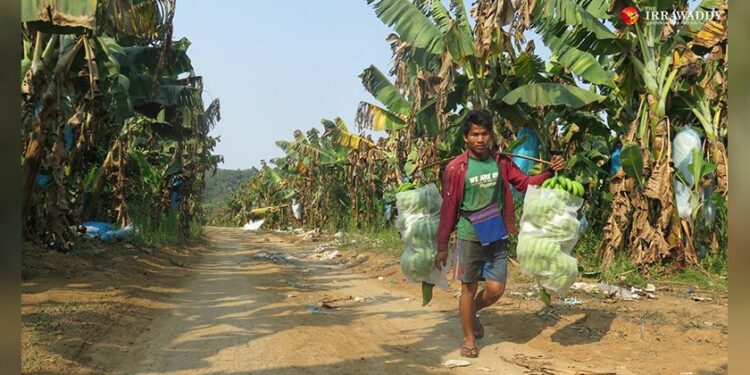Naypyitaw – The Upper House of Myanmar’s Union Parliament on Wednesday approved a discussion on a proposal to control China-backed banana plantations in Kachin State in northern Myanmar.
In his proposal, parliamentarian Dr. Khun Win Thaung of Kachin State said an increasing number of Chinese companies were planting tissue-culture bananas, threatening the community’s way of life.
He called for government coordination to systematically regulate Chinese companies growing bananas and lessen the negative impact on Kachin State and to collect tax from banana growers.
After residents complained about environmental problems and land disputes with the plantations, the authorities began taking steps to regulate the banana trade.
“Now we have imposed a ban on new cultivation but existing plantations keep operating. Kachin farmers are, therefore, suffering. We hope that, if my proposal is passed, the Parliament will be able to apply pressure and departments can enforce regulations more strictly and this will alleviate residents’ suffering,” Dr. Khun Win Thaung told The Irrawaddy.
Although bananas were being grown on a commercial scale in Kachin State, the authorities were not receiving enough tax from them, he said.
“It is like stealing from the back door. Those companies are Chinese but they are registered under Myanmar citizens,” said the parliamentarian.
Tens of thousands of trucks transporting bananas to China also damage roads and bridges, he said.
Banana cultivation was still a profitable business for Kachin residents because of the considerable Chinese demand, the parliamentarian said.
China needed around 486,000 hectares of banana plantations to meet domestic demand, but at present, it only had around 200,000 hectares of banana plantations, said Dr. Khun Thaung Win, suggesting Myanmar should fill the demand.
But the Myanmar government must ensure Chinese companies pay the correct tax and follow environmental regulations, he said.
“More companies will come, but if we don’t welcome them, they will go elsewhere. Laos has invited Chinese banana investment,” Dr. Khun Thaung Win said.
Some Chinese firms have been growing bananas for more than a decade in Kachin State.
“[Companies] hire vacant land from farmers. Banana cultivation might damage the land although we do not know the extent of the harm. There are some advantages. In some places, roads have been improved and the businesses also provide an income for laborers,” said Dawt Tang Gun of Waingmaw Township in Kachin State.
But he claimed the Chinese companies use powerful pesticides that kill fish. Pesticides were smuggled in bulk across the border, Dawt Tang Gun added, saying that residents feared the long-term effect on the soil.
Chinese companies usually rent land for six consecutive years with a contract. The rent they pay is around 200,000-300,000 kyats (about US$130-200) per acre, depending on whether the land is under cultivation. One acre is equal to 0.4 hectares.
Dr. Khun Win Thaung said some farmers did not know their land was being given to Chinese companies, he added.
“If this situation goes on, land disputes will not be resolved,” said the parliamentarian.
In May, residents complained about a company illegally growing bananas in Dawhpumyang in Kachin State and that the authorities had allowed it to acquire land under the Vacant, Fallow and Virgin Land Management Law.
Banana plantations have spread across Kachin State and there are reports that companies are seeking permission to expand to Sagaing and Mandalay regions and Shan State. The Irrawaddy could not confirm the reports.
You may also like these stories:
Five Chinese Arrested for Trespassing, Illegal Immigration in Kachin
Growing a Controversy: A Kachin Banana Plantation in Pictures

















